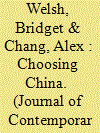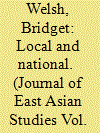| Srl | Item |
| 1 |
ID:
137498


|
|
|
|
|
| Summary/Abstract |
This article examines East Asians and Chinese nationals who select ‘China as a model’ of development. The analysis looks at both macro and micro explanations to show that China's standing as a development model is not in sync with its status as a rising global and regional power. At the macro level, the focus is on country-level patterns, while the micro analysis is drawn from the third wave surveys of the Asia Barometer Survey data conducted from 2011 to 2013 in 13 different countries. The findings suggest that political values, history, geography and socio-economic conditions correspond to different views of China as a model and that those outside of China who select the country as a model are quite different from those in China itself.
|
|
|
|
|
|
|
|
|
|
|
|
|
|
|
|
| 2 |
ID:
084040


|
|
|
|
|
| Publication |
2008.
|
| Summary/Abstract |
From horrific accounts of men decapitated to "ordinary" accounts of stolen motorcycles, the routine beating and killing of alleged criminals by mobs (massa) has become common in Indonesia. This article examines the patterns of keroyokan-mobbing-from 1995 through 2004 in four provinces and highlights the temporal, spatial, and substantive variations of this phenomenon. Drawing from a database of provincial and local news clippings in Bali, Bengkulu, West Java, and South Kalimantan and in-depth case studies and interviews, this article shows that mobbing varies considerably. Its causes are national and local. The temporal data show that nationally the most important factor to influence levels of mobbing was the introduction of decentralization. The power vacuum that resulted from the policy decision to transfer authority from the center to localities increased local violence. Yet this macrolevel explanation is inadequate to show the spatial variation and different forms of mobbing violence. To understand the causes of these dimensions of variation, one has to move away from macronational approaches measuring violence and include a more microethnographic local approach. A richer understanding of mobbing must be locally rooted. This article uses three case studies to illustrate the centrality of local factors affecting this form of violence. The case studies suggest that mobbing is shaped by the acquiescence of actors in local communities and local learning. The article draws attention to the need to incorporate local data and methods into an analysis of violence in Indonesia and to appreciate varied daily rituals of violence as reservoirs of conflict.
|
|
|
|
|
|
|
|
|
|
|
|
|
|
|
|
| 3 |
ID:
076413


|
|
|
| 4 |
ID:
140643


|
|
|
|
|
| Summary/Abstract |
The March 2015 death of an iconic leader, former Prime Minister Lee Kuan Yew (LKY), marks a turning point in Singapore’s history. Known for putting the city-state on the international stage by promoting economic growth while emphasizing stability over democracy, LKY personified the country and defined its political foundation. Even as he lay dying, scholars were speculating as to whether the country could survive without him. This momentous event occurred in a year with another important milestone: Singapore celebrated its fiftieth anniversary as a nation in August. Since it was expelled from Malaysia in 1965, Singapore has flourished, and won wide acclaim for its successes, especially when compared with its neighbors in the region.
|
|
|
|
|
|
|
|
|
|
|
|
|
|
|
|
| 5 |
ID:
123362


|
|
|
|
|
| Publication |
2013.
|
| Summary/Abstract |
[T]he incumbent forces have reformulated old strategies to deflect contenders for power while narrowing the political space for substantive reform.
|
|
|
|
|
|
|
|
|
|
|
|
|
|
|
|